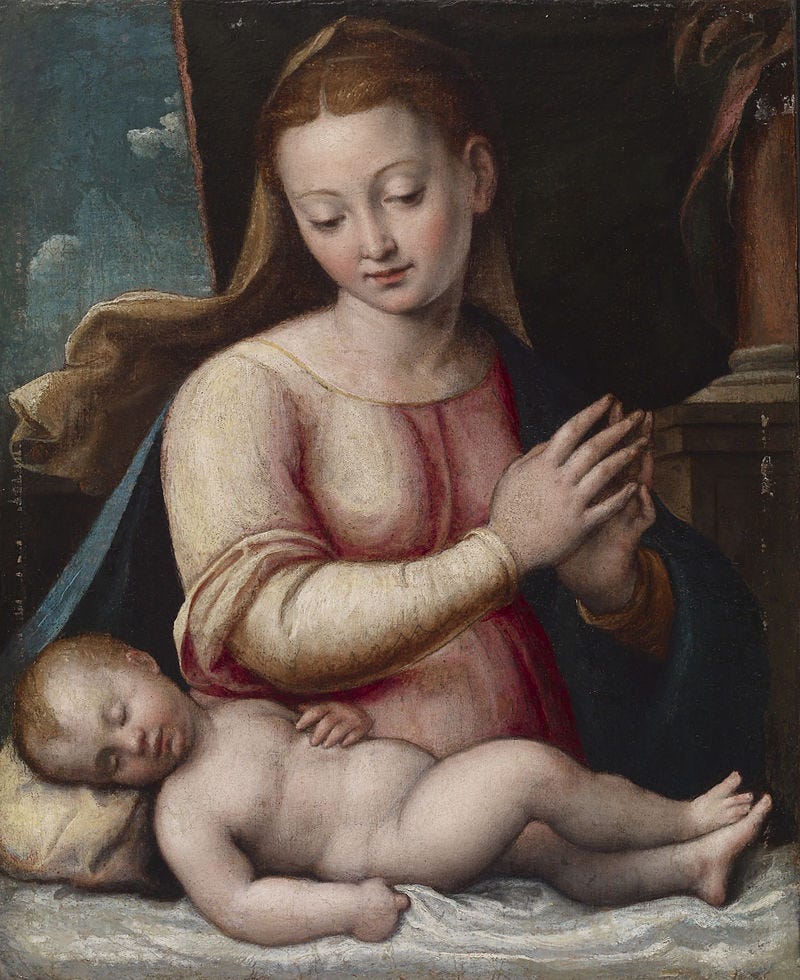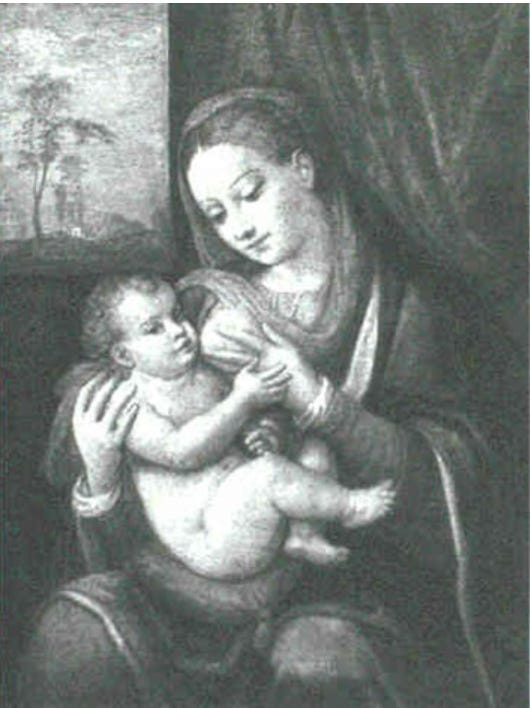How good—to be alive! How infinite—to be Alive—two-fold—The Birth I had And this—besides, in—Thee!
Forty days ago, my son was born in a room overlooking two oak trees, the snow on the ground being stirred up in the night’s wind coming off the lake.
The night before his birth, a pain descended onto me like a premonition and I was comforted by its presence, a glimpse of the unknown and presumably unlimited pain to come, as if a handle had been offered for me to grasp. The abstraction pregnancy had begun with returned when it was time to give birth; it seemed inconceivable that he would pluck a handful of consciousness out of the universe and emerge as a self. Labour began with that handle and pulled me into its grasp. I remained tethered to earth only by Chris’s hand. I faced a large digital clock and at eleven in the evening I knew he had to be born before the day clicked into the next, and was right. He sustained a small cut on his head in the ordeal, which is just now healing, a mark of our twin bond. As Dickinson puts it, though she was not speaking of childbirth, it was like being alive two-fold, like being born twice. Not born again, but twice.
The various religions appear to agree that the first forty days of a child’s life are decisive; the baby’s soul in peril from evil spirits, fairies, djinns. This is also the period of maternal confinement and recovery, and many cultures believe the mother is also at risk of evil forces. In the Balkans after forty days the mother and baby can receive their first visitors, who should bring gold, or round cakes, or chickens with their heads still on. At the other end, the souls of the dead are afforded forty days to wander the earth before that next promised world.
Somehow I ended up reading Paglia for the first time during my pregnancy. She says that we call nature beautiful in an attempt to tame it, thus failing to look at the truth of its terrifying indifference and ugliness. For example, we say the baby is cute in order to distract from an unspeakable truth about the unstoppable, faceless force of nature that churns through us with biologic intention, moving our bones apart to achieve its paramount goal of more existence, without even consciousness, blindly and stubbornly pushing forth like the roots of tree moving concrete. The baby is God's silent automaton.
When I was pregnant, I felt the baby swish in my belly and imagined this to be the best time of its not yet begun life - no needs, no gravity, no consciousness. And yet it has the imperative to grow, to move, to eventually exit the ideal world of the womb, even though he will suffer forever from the moment he does. Still, the baby has the desire to get out as strongly as the desire to return. Slouching eternally towards our exile, unable to follow any other coordinates. His cry upon his entry confirmed this idea. He was put on my chest and rubbed for warmth; as if meeting his earthly and fallible parents was meant to be a consolation for what he had lost.
In the days after his birth I felt that I had cleaved and now had two bodies that were equally my own. In the brief moments apart from him, in the shower, I treated my own body as gingerly as I was treating his, still unused to holding him and afraid of his complete defenselessness. I ate with the same vigour and panic as he did, I slept in bursts with the same devotion to the task. His perfection was the consolation I received for the cracking open of the soul and body - a permanent fissure in which the baby is to be wedged forever. These days passed slowly, in two hour intervals of pure survival for both him and me. The year felt young and blue in the middle of the night with snow growing crisp in the cold.
In my newfound interest in the images of the holy dyad of the Madonna and child, I came upon the paintings of Barbara Longhi, a Renaissance painter who painted small and intimate portraits and did not receive as much recognition as her father and brother, both painters. Her paintings of the mother and baby describe with total accuracy the tone of the postpartum: adoring the baby/feeding the baby.
In one moment, I adore the perfection of the baby, the swirl of his hair, the impossible size of his hands, his sleeping grimaces. Once the baby is hungry, he becomes unrecognizable, angry and inconsolable, and I become flooded with the need to correct whatever was wrong and the fear that I will be unable to. The hungry baby pouts, holds his breath, turns red. Equally mercurial, once he tastes milk his crying stops, he becomes pliant again, his eyes somewhat shocked that he is receiving that which he desired and had feared was never again to be had. I can once again return to the adoration of the child.
In the house, baby is a minor god we worship and strive to please, at whose mercy and whim we receive sleep or sustenance. He derives his power precisely from his vulnerability, which is complete and devastating. The simple biological and yet deeply moral rule is that Chris and I are compelled to protect him while our own bodies suffer. I read somewhere that in Islam, if a breastfeeding mother dies, she attains the reward of a martyr.
Though it is as if the entire world is constructed so as to deny the power of the baby. To pretend that society ought to be structured as if the central fact of our being is not that we survive because our vulnerability was honoured. The baby is proof that an inherent drive toward attentive care must grace our species, and every day this extraordinary fact echoes through infinite careful gestures across the world. The baby pushes forth its difficult, almost impossible demands and somehow, on the whole, these demands are more or less met. Or it is god, through the emissary of the baby, who drives humanity forward in this most unlikely manner - shackling us to the pit of dependency in each of us and therefore to each other.






♥️♥️♥️